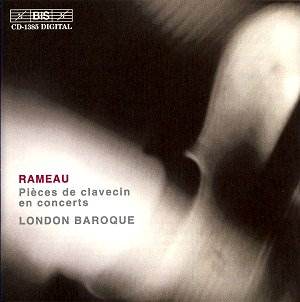Jean-Philippe
Rameau was roughly a contemporary of Bach, and began his musical
career as an organist and composer of several books of harpsichord
music. In 1741 he published a set of Pièces de clavecin
en concerts, or harpsichord "concerts". These works are neither
concertos nor sonatas, but rather compositions where the harpsichord
and violin have equal importance. While similar works generally
featured only a violin in addition to the harpsichord, Rameau
added to his a bass viol, giving these pieces more depth. In fact,
while the violin parts in these works are simple, and sound like
mere embellishments, the viol parts are complex. (The liner notes
by Charles Medlam suggest that they are "in some instances close
to unplayable".)
But
these works don't come at all close to the intensity or the harmonic
universe of Rameau's operas, for which the composer is best known.
These highly attractive pieces are light and enjoyable, and full
of melodic invention ó just because they don't attain the same
level of quality as Rameau's operas does not mean that they are
inferior works. Rameau explores a variety of harmonic and contrapuntal
effects among the three instruments, and the viol is never fully
a solo instrument nor is it ever entirely a continuo instrument.
One
can appreciate this very good recording, and especially its excellent
sound, yet remain unmoved by the interpretation offered by London
Baroque. While technically the pieces are performed impeccably,
they lack inspiration at times. The slow movements often sound
slow; not deep, intense or emotive. The second movement of Concert
No. 2 seems to plod, and the beauty of the harmonies between the
harpsichord and violin don't become apparent. Comparing this with
London Baroque's previous disc (a transcription of Bach's trio
sonatas for organ) shows that this recording pales in comparison.
In the Bach, London Baroque make the slow movements intense meditations.
Here, I cannot feel very much apart from the notes.
The
musicians are more effective when playing the fast movements,
and Rameau's inventiveness comes through here very well. The final
movement of Concert No. 3 has the tone of some of the orchestral
interludes included in his operas, and London Baroque perform
this energetic music convincingly. The same is the case for the
final movement of Concert No. 5, La Marais, where the violin
takes off into the higher ranges and sings over the articulate
harpsichord. But here, as in some other movements, the harpsichord
is recorded too far back, and the listener hears more of a violin
sonata than a "concert for harpsichord".
Perhaps
my criticism is unjust, and in part fuelled by the excellent quality
of the several recent recordings of these works. Comparing this
recording with the one made by Blandine Rannou (for Zig-Zag Territoires)
shows that Rannou infuses these works with much more vigour and
verve, while London Baroque are more staid.
London
Baroque give a commendable performance, but one that remains too
much on the surface and doesn't plumb the depths of these fine
works.
Kirk
McElhearn
